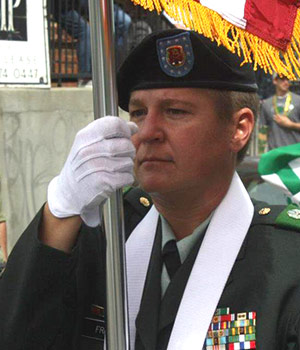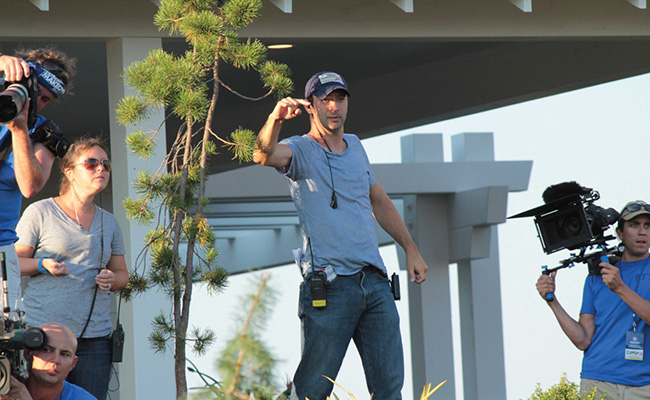Sgt. Fritz’s Story: Colorado soldier discharged during Don’t Ask Don’t Tell reenlists

Sergeant First Class Luiza Fritz, an Army veteran who served in Iraq twice before being discharged under Don’t Ask Don’t Tell, has finally overcome a long personal and bureaucratic battle for the opportunity to serve in uniform again.
It began in June 2008, when Fritz – on active duty as a platoon sergeant in Iraq at the time – came home on leave. “One of my soldiers emailed me from Bagdad,” said Fritz. The message read an investigation had been opened concerning her homosexuality. “I had no idea.”
The soldiers under her command were worried something would happen to their platoon leader, and asked Fritz what to do. “I said, you know what, I’ve always taught you guys to have integrity. Tell the truth. Let me fight my own battles. I’ll take care of it.”
 Before she left Iraq on leave, Fritz and a first sergeant had been in a disagreement over Army policy. “They took a lot of my guys and reassigned them to their own NCOs (Non-commissioned Officers), and basically the first sergeant told me they’re not yours anymore.”
Before she left Iraq on leave, Fritz and a first sergeant had been in a disagreement over Army policy. “They took a lot of my guys and reassigned them to their own NCOs (Non-commissioned Officers), and basically the first sergeant told me they’re not yours anymore.”
There was an immediate conflict. “He [the first sergeant] and I butted heads. He didn’t like policy, and I did.” Fritz found herself in the unusual position of answering to two commands.
“At some point, I think, they got it in their minds that they were going to dig. They were going to find something.” A soldier under Fritz’s command informed the first sergeant of a MySpace page Fritz shared with her partner at the time.
“It was private, so the first sergeant ordered one of my soldiers to pull up my MySpace page, and he stuck a thumb drive in the computer and saved it.” The information was turned into the Inspector General’s Office, sparking the investigation.
Fritz and her partner at the time had applied for a committed partnership in Denver. The registry was public record, and was used as evidence against her. “When I got back [from leave], I was relieved of duty.” Her discharge paperwork read homosexual conduct, attempted marriage – despite that fact that same-sex marriage is banned by Colorado Constitutional Amendment 43.
“It was the loneliest flight home ever,” said Fritz, reflecting on her trip back to Denver. “I had to come home in civilian clothes. I flew [home] by myself, and that was it. I was out.” She had served nearly 14 years with the 186th Iowa National Guard Military Police Company.
“I was probably in a state of depression for at least a year. Things didn’t seem normal to me. I didn’t care about anything. Anytime I’d see the flag, I’d turn my head, and it would piss me off. I hated feeling that way. I hated it.”
Fritz’ military career had ended after more than a decade in service. She first shipped off to Ft. McClelland, Alabama for basic training in 1995, three days after graduating from Bayfield High School in Colorado. Out Front asked Fritz where her inspiration to serve came from; she didn’t hesitate with an answer: “My mom. She’s a patriot. Absolute patriot. Her heart bleeds red, white and blue.”
Nancy Fritz joined the Woman’s Army Corps immediately out of college during the Vietnam era, working as a financial specialist. “Something about serving those three years just made her a true patriot. Every basketball game, every rodeo, they would play the national anthem and she’d stand there with her chest out, hand over her heart, and she’d cry. Every time.”
Fritz’s mother kept an old American flag neatly folded in an Army box, which she flew every 4th of July. “That changed when I was discharged,” said Fritz. “She was hurt to the core, as well as I. She took that flag and tucked it away. She told me she would refuse to fly that flag until I had justice.”
Justice seemed within arm’s reach when DADT was repealed by Congress in December of 2010, becoming official on September 20, 2011. By then, more than 14,500 servicemembers had been discharged because of their sexual orientation.
“I started the process right after the repeal,” said Fritz. “I went down to the recruiter, they sent the paperwork forward. Then they saw that I had a general discharge.”
Even though Fritz had a distinguished military career with no unfavorable reports on her record, she was given a “general” discharge. At that time, military policy classified all DADT discharges as general, and only servicemembers with an “honorable” discharge could reenlist.
“So, my foot was in the door, and then the door was slammed in my face.” Adding insult to injury, the Department of Defense began garnishing Fritz’s wages, recouping an enlistment bonus she received in Feb of 2007. “I felt so slighted. So absolutely slighted.”
Fritz fought back by sharing her story through media interviews. It was then she met John Kelly, an Air Force veteran and volunteer at the GLBT Community Center of Colorado. Together they founded the Colorado GLBT Color Guard.
“I wanted to prove to the heterosexual community that we [LGBT servicemembers] were no different, and damn you for thinking that, because I was a good soldier. Gay and lesbian veterans, soldiers, sailors, airmen, marines – we’re the same. We can do the job just as good as anybody else.”
Kelly and Fritz petitioned a theme for the 2011 Denver PrideFest honoring LGBT servicemembers: These Colors Don’t Run. The newly formed GLBT Color Guard led the parade that year. In November, they marched in the Veteran’s Day Parade – the first time in Colorado’s history an openly gay color guard marched in the parade.
“Once I put that uniform back on just to do the parades, it changed,” Fritz said, “I started to get my patriotism back.” The GLBT Color Guard is now sponsored by the American Veterans for Equal Rights and is the visible arm of the AVER Rocky Mountain Chapter.
Rejuvenated and more determined than ever, Fritz began the arduous process of upgrading her discharge status. She submitted all the paperwork to the Army Discharge Review Board and waited. There was no way to check on the status.
“I was stuck, wrapped up in red tape,” said Fritz, who was in administrative limbo for almost a year before finally receiving a response. “I got home from work, and I was walking the dog. I check the mail, and there’s this big envelope. I see Department of Defense. I looked at it for a minute, opened it, and I start reading it.”
Her discharge status upgrade had been approved unanimously by a five-member panel of officers. Fritz was eligible to reenlist. “I started crying. Tears. My heart started pounding. I got on my phone. I
called my girlfriend. I called my mom. ‘Oh my God! I got it! I got it! I got it!’”
Her next call was to the Army recruiter. They scheduled Fritz to meet the next day. “The coolest thing that he [the Army recruiter] said to me when I walked in with that report: ‘Well, let’s get you back in the Army.’”
Fritz finalized her medical paperwork at the Military Entrance Processing Station in downtown Denver. While there, younger recruits asked Fritz why she was discharged. When Fritz responded that she was a DADT discharge, “half of them didn’t know what that meant. They had this weird look on their face, asking why.”
On Tuesday, March 26 at 1100 hours, Sergeant First Class Luiza Fritz raised her right hand and took the oath of enlistment, officially becoming a member of the United States Army, again. She will be stationed with the 1-104th M.P. Regiment in Aurora as a military police instructor, retaining the same rank she had when she was discharged.
“Keep pushing and keep cutting that red tape,” Fritz said to other servicemembers still struggling to get back into the military. “Do it. Go. If it takes 14,000 phone calls, make them.” And to the gay servicemembers who are currently serving, Fritz had one more piece of advice. “Be a soldier first. Be gay second. Because being a soldier is more important.”
When asked if her mother would fly the American flag this year, Fritz responded: “If I go home for the 4th of July this year, we’ll get it out together and put it up.”
What's Your Reaction?
Greetings. I’m Mike. People call me Mike. I’m just a gay guy trying to be creative before I’m kicked off this spinning, planet-sized spaceship hurdling through the void of space. Writing and photography are the creative outlets I spill my brain into when mental monsters start clawing at the back of my eyes. I only hope these articles provide readers with a few insights I’ve carefully gathered in cupped hands, cracked hands that have dueled for decades with these nebulous shadows that haunt so many lives. Plus, writing is a great way to pass the time on this planet-sized spaceship hurdling through the void of space.










